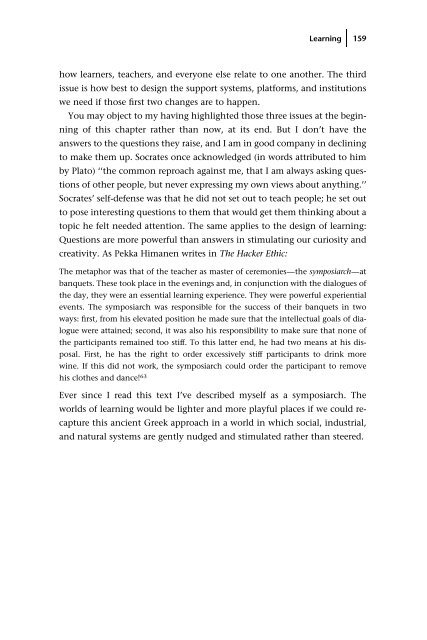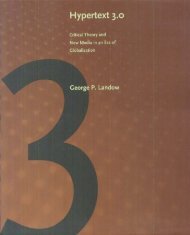- Page 1 and 2:
IN THE BUBBLE DESIGNING IN A COMPLE
- Page 4 and 5:
In the Bubble Designing in a Comple
- Page 6:
Contents Acknowledgments vii Introd
- Page 9 and 10:
viii Acknowledgments many journalis
- Page 12 and 13:
Introduction ‘‘In the bubble’
- Page 14 and 15:
smarter—and usually cheaper—pro
- Page 16 and 17:
Introduction 5 innovation—results
- Page 18 and 19:
Introduction 7 ply to all kinds of
- Page 20 and 21:
1 Lightness I am driving along the
- Page 22 and 23:
Lightness 11 there are a lot of the
- Page 24 and 25:
Lightness 13 areas of productive la
- Page 26 and 27:
into product development have resul
- Page 28 and 29:
necessities—food, clothing, shelt
- Page 30 and 31:
own weight to manufacture such an o
- Page 32 and 33:
BodyMedia took a communication desi
- Page 34 and 35:
Lightness 23 for feedback and sense
- Page 36 and 37:
Lightness 25 and writer Antoine Sai
- Page 38:
Lightness 27 ‘‘Lightness,’’
- Page 41 and 42:
30 Chapter 2 Questioning speed and
- Page 43 and 44:
32 Chapter 2 burn as much fossil fu
- Page 45 and 46:
34 Chapter 2 standard of living of
- Page 47 and 48:
36 Chapter 2 also warned that the a
- Page 49 and 50:
38 Chapter 2 picture. Speed, in thi
- Page 51 and 52:
40 Chapter 2 To fill this gap, howe
- Page 53 and 54:
42 Chapter 2 quitting work, or goin
- Page 55 and 56:
44 Chapter 2 measures, such as redu
- Page 57 and 58:
46 Chapter 2 water, and nutrients i
- Page 59 and 60:
48 Chapter 2 Service has identified
- Page 61 and 62:
50 Chapter 2 the right tempo with t
- Page 63 and 64:
52 Chapter 3 Why Mobility Matters M
- Page 65 and 66:
54 Chapter 3 ‘‘Time is money, w
- Page 67 and 68:
56 Chapter 3 failure. The average c
- Page 69 and 70:
58 Chapter 3 journey is by air on A
- Page 71 and 72:
60 Chapter 3 of mobility is unsusta
- Page 73 and 74:
62 Chapter 3 room that blends physi
- Page 75 and 76:
64 Chapter 3 were inspired by the s
- Page 77 and 78:
66 Chapter 3 Digital playgrounds ar
- Page 79 and 80:
68 Chapter 3 puter world, in which
- Page 81 and 82:
70 Chapter 3 that matters, accordin
- Page 83 and 84:
72 Chapter 3 such as walking, bikin
- Page 85 and 86:
74 Chapter 4 four or five thousand
- Page 87 and 88:
76 Chapter 4 a city for passive par
- Page 89 and 90:
78 Chapter 4 creative. The survey i
- Page 91 and 92:
80 Chapter 4 Futures models the geo
- Page 93 and 94:
82 Chapter 4 The Regionmaker as one
- Page 95 and 96:
84 Chapter 4 Handsets allow users t
- Page 97 and 98:
86 Chapter 4 Relationships mediated
- Page 99 and 100:
88 Chapter 4 centers—but left mos
- Page 101 and 102:
90 Chapter 4 been able to reduce th
- Page 103 and 104:
92 Chapter 4 chapter, much of the w
- Page 105 and 106:
94 Chapter 4 An Icelandic designer,
- Page 107 and 108:
96 Chapter 4 In this chapter, I hav
- Page 109 and 110:
98 Chapter 5 we made was to move tw
- Page 111 and 112:
100 Chapter 5 complex interactions,
- Page 113 and 114:
102 Chapter 5 Planning a big transp
- Page 115 and 116:
104 Chapter 5 says Winnicott, ‘
- Page 117 and 118:
106 Chapter 5 by architects or syst
- Page 119 and 120: 108 Chapter 5 the point. The fundam
- Page 121 and 122: 110 Chapter 5 We were seen rather p
- Page 124 and 125: 6 Conviviality Whole nations now wo
- Page 126 and 127: Wellware Conviviality 115 Confronte
- Page 128 and 129: More and more people are convinced
- Page 130 and 131: Conviviality 119 peer production of
- Page 132 and 133: One online user of a support servic
- Page 134 and 135: meet the needs on their behalf.’
- Page 136 and 137: perous regions make similar points:
- Page 138 and 139: Conviviality 127 m Redefining work
- Page 140 and 141: Once a population expands beyond a
- Page 142 and 143: Connected Communities Conviviality
- Page 144 and 145: Throughout history, human beings ha
- Page 146 and 147: 7 Learning Learning as a Design Iss
- Page 148 and 149: e able to transfer knowledge from o
- Page 150 and 151: institutions to join them; these in
- Page 152 and 153: in e-learning continues at signific
- Page 154 and 155: some kind of Learning Central, that
- Page 156 and 157: launched a website accessible from
- Page 158 and 159: Learning 147 geology, viticulture,
- Page 160 and 161: The most interesting phase of a pro
- Page 162 and 163: degree and quality of reflection de
- Page 164 and 165: Learning 153 rapid, mass, large-sca
- Page 166 and 167: Learning 155 with a learner. What p
- Page 168 and 169: Learning 157 standing. Banks, oil c
- Page 172 and 173: 8 Literacy A few years ago I met a
- Page 174 and 175: Literacy 163 In biblical times, a s
- Page 176 and 177: Literacy 165 surface or at the leve
- Page 178 and 179: on passive consumption of authorita
- Page 180 and 181: of the entire known universe, has b
- Page 182 and 183: Literacy 171 ‘‘external’’ t
- Page 184 and 185: at the same time.’’ 35 Speech i
- Page 186 and 187: Literacy 175 break in continuity de
- Page 188 and 189: ook is about how this tendency exte
- Page 190 and 191: Literacy 179 to extract coffee arom
- Page 192 and 193: Zeldin’s book signified ‘‘the
- Page 194 and 195: cal results with simple technology.
- Page 196 and 197: 9 Smartness Imagine, for a moment,
- Page 198 and 199: technology to the people who are su
- Page 200 and 201: are unaware that particularly valua
- Page 202 and 203: and optimize the distribution of th
- Page 204 and 205: The potential is fantastic, but we
- Page 206 and 207: Smartness 195 shape when you heat t
- Page 208 and 209: any attempt simply to copy the resu
- Page 210 and 211: so small we can barely see them, th
- Page 212 and 213: an identification document. The rol
- Page 214 and 215: Smartness 203 own bodies will be us
- Page 216 and 217: Smartness 205 Greger Linden, a Finn
- Page 218 and 219: Smartness 207 sulted. The twenty-mi
- Page 220:
Smartness 209 ing up with each othe
- Page 223 and 224:
212 Chapter 10 the situation. In a
- Page 225 and 226:
214 Chapter 10 would nudge it into
- Page 227 and 228:
216 Chapter 10 From Top-Down Design
- Page 229 and 230:
218 Chapter 10 everything from scra
- Page 231 and 232:
220 Chapter 10 What service designe
- Page 233 and 234:
222 Chapter 10 local user experts w
- Page 235 and 236:
224 Chapter 10 From Design as Proje
- Page 237 and 238:
226 Chapter 10 The dance of the big
- Page 239 and 240:
228 Notes to Pages 3-10 transformat
- Page 241 and 242:
230 Notes to Pages 11-12 8. Lennart
- Page 243 and 244:
232 Notes to Pages 16-17 23. Han Br
- Page 245 and 246:
234 Notes to Pages 20-27 defunct an
- Page 247 and 248:
236 Notes to Pages 33-37 16. Intera
- Page 249 and 250:
238 Notes to Pages 41-46 ‘‘Six
- Page 251 and 252:
240 Notes to Pages 52-54 year.’
- Page 253 and 254:
242 Notes to Pages 57-60 23. Hau Le
- Page 255 and 256:
244 Notes to Pages 67-71 43. Craft
- Page 257 and 258:
246 Notes to Pages 75-79 and more o
- Page 259 and 260:
248 Notes to Pages 82-87 23. Winy M
- Page 261 and 262:
250 Notes to Pages 91-103 52. John
- Page 263 and 264:
252 Notes to Pages 107-113 18. Info
- Page 265 and 266:
254 Notes to Pages 116-118 11. Luci
- Page 267 and 268:
256 Notes to Pages 122-125 Internat
- Page 269 and 270:
258 Notes to Pages 130-132 that a b
- Page 271 and 272:
260 Notes to Pages 138-141 Politica
- Page 273 and 274:
262 Notes to Pages 145-149 35. Twig
- Page 275 and 276:
264 Notes to Pages 156-164 56. Soni
- Page 277 and 278:
266 Notes to Pages 168-172 19. Gary
- Page 279 and 280:
268 Notes to Pages 175-178 45. Davi
- Page 281 and 282:
270 Notes to Pages 185-191 9 Smartn
- Page 283 and 284:
272 Notes to Pages 193-195 was rebu
- Page 285 and 286:
274 Notes to Pages 199-201 by Gille
- Page 287 and 288:
276 Notes to Pages 202-204 52. Drug
- Page 289 and 290:
278 Notes to Pages 206-211 65. Poli
- Page 291 and 292:
280 Notes to Pages 216-221 15. Edwa
- Page 294 and 295:
What to Read Next Ten Books to Read
- Page 296 and 297:
Holloway, Richard. Looking in the D
- Page 298 and 299:
Bibliography Alakeson, Vidhaya, ed.
- Page 300 and 301:
Csikszentmihalyi, Mihaly. Flow and
- Page 302 and 303:
Holland, John H. Adaptation in Natu
- Page 304 and 305:
Mitchell, William J. The Reconfigur
- Page 306:
van Hinte, Ed, and Conny Bakker. Tr
- Page 309 and 310:
298 Index Apollo, 140 Appointments,
- Page 311 and 312:
300 Index Communication (cont.) sup
- Page 313 and 314:
302 Index Design (cont.) humanity a
- Page 315 and 316:
304 Index Energy (cont.) transporta
- Page 317 and 318:
306 Index Hansa League, 80 Hanze Ex
- Page 319 and 320:
308 Index Industry (cont.) transpor
- Page 321 and 322:
310 Index Learning (cont.) economic
- Page 323 and 324:
312 Index Mentors, 151-152 Merleau-
- Page 325 and 326:
314 Index Pitroda, Sam, 91, 249n51
- Page 327 and 328:
316 Index Smartness (cont.) bio-mec
- Page 329 and 330:
318 Index Storytelling, 161, 181 St
- Page 331 and 332:
320 Index United States (cont.) lea





